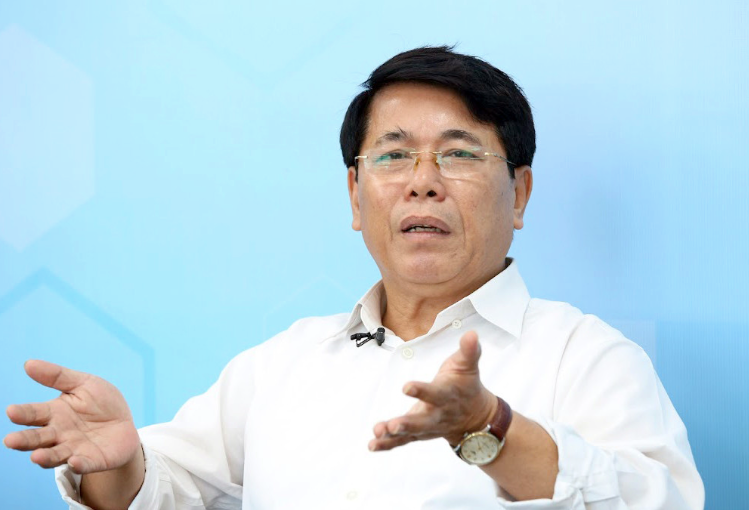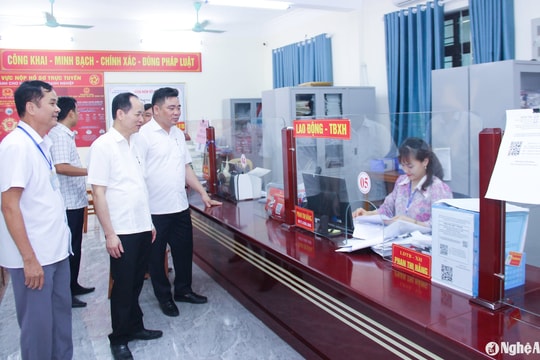'Officials with shortcomings and lack of prestige should resign to clear their conscience'
It is most appropriate for cadres and party members who do not fulfill their assigned tasks to be willing to transfer to other jobs. Cadres and party members who resign with such a mindset will have a clear conscience.
Professor Phan Xuan Son, senior lecturer at the Ho Chi Minh National Academy of Politics, said that he personally strongly supports the Central Committee's policy of encouraging officials to resign when they have shortcomings.
Reporter: The General Secretary has just signed and issued Resolution 28 of the 6th Central Conference, which mentions encouraging officials to resign when they have shortcomings. With the work of preventing corruption and waste being promoted at present, what is the significance of this regulation, sir?
Prof. Dr. Phan Xuan Son:There are many different reasons for each cadre and party member to "hang up their official seal and resign", such as not being able to fulfill the assigned tasks; having "stumbled" in the process of performing official duties, affecting their personal reputation, and being inconvenient for leadership and management...
In my opinion, it is most appropriate for cadres and party members who do not fulfill their assigned tasks to be willing to transfer to other jobs. Cadres and party members who resign in such a state of mind will have a clear conscience.
The resignation of cadres and party members when they have shortcomings also contributes to liberating the apparatus, creating conditions for the organization to arrange more suitable personnel.
 |
Prof. Dr. Phan Xuan Son - senior lecturer at Ho Chi Minh National Academy of Politics. Photo: Tuan Anh |
It is also ethically appropriate for every cadre and party member who has shortcomings to resign. That is, they must be ready to take responsibility for all their decisions in the process of performing their official duties.
The General Secretary issued Resolution 28 of the 6th Central Conference, which mentioned encouraging cadres to resign when they have shortcomings, summarizing previous regulations on cadre work, especially the issue of resignation and handling of cadres, party members, and party organizations with shortcomings.
As a scientist, I strongly support this policy. However, how to implement it to avoid formalism also needs to be carefully studied and discussed. From there, we can overcome the situation of having regulations but not implementing them or implementing them but not commensurate with the actual work. That is, many people who deserve to resign still avoid implementing the regulations.
PV: In fact, over the years, very few officials with shortcomings have asked to resign. What do you think is the reason?
Prof. Dr. Phan Xuan Son:There are many reasons why officials with shortcomings do not resign. The most typical is that public opinion does not understand resignation correctly. Therefore, we need to propagate to the people that resignation of officials with shortcomings is a normal thing. That is, there are ups and downs, there are ins and outs, if they cannot do the job or have shortcomings, and no longer have enough prestige, they will hand over the job to someone else to do.
For the clan, family, and friends, there is often too much pressure on those in positions. Those in positions must always be this or that, must be promoted to become this or that. When an official resigns, it has a huge impact on the clan, family, and friends.
In particular, many officials do not resign because they are not willing to give up the benefits that the position brings. To be honest, when being a leader or manager with the right to make decisions, that official can enjoy many benefits.
PV: How to overcome the above problem, sir?
Prof. Dr. Phan Xuan Son:To overcome the problems I have just pointed out, we must do ideological work for all parties, including cadres and party members with shortcomings, as well as public opinion, their relatives and friends, to understand that resignation is normal.
In many countries, resignation has become a culture. In our country, few officials have resigned so the implementation is still difficult. In my opinion, if officials and civil servants resign when they are young, they will have more opportunities to work in fields and professions that are suitable for their abilities and qualifications.
Reporter: The new point in the recent 6th Central Conference was that for the first time, 3 officials under the Central Committee's management resigned from the Party Central Committee. In your opinion, does this decision pave the way for a culture of resignation?
Prof. Dr. Phan Xuan Son:In fact, the three Central Committee members who were recently approved to resign from the Party Central Committee also had shortcomings and were publicly announced by the Party's inspection agency. Through this, I also hope that the culture of resignation will become normal for every cadre and Party member from the Central to the local level. That means that in the work of cadres, there must be entry and exit, up and down.
PV: In your opinion, how can all levels of sectors, localities and each cadre and party member perceive and properly implement the requirement to encourage cadres to resign when they have shortcomings?
Prof. Dr. Phan Xuan Son:First of all, we must unify and thoroughly grasp the content of Resolution 28 of the 6th Central Conference from the Central to the local level, to each cadre and party member.
In addition, it is also necessary to widely propagate to the masses. That means it is necessary to thoroughly understand the ideology from within the Party and outside the society. The process and procedures for resignation must also be streamlined, reasonable, and emotional, avoiding ideological consequences for each cadre and Party member.

23/11/2022


